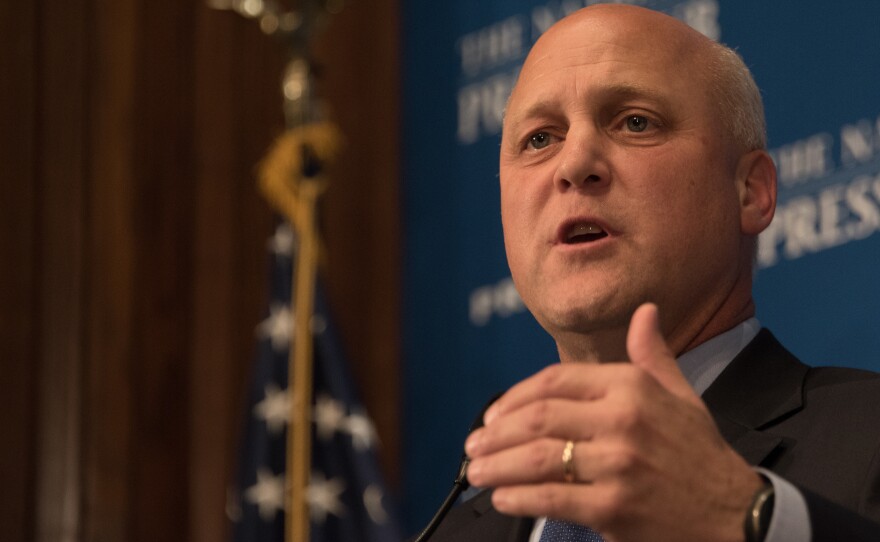Mitch Landrieu spent eight years as the Mayor of New Orleans, overseeing the city's post-Katrina recovery between 2010 and 2018. He later became President Joe Biden's infrastructure czar.
Landrieu was in Newport News this week to address the Hampton Roads Social Justice Conference.
WHRO sat down with the former mayor to talk about some of the challenges New Orleans and Hampton Roads have in common.
This conversation has been edited for length and clarity.
WHRO: There are a ton of parallels between our region and New Orleans. A big one is housing. How does a city facing housing access and gentrification issues best address the needs of low-income residents?
Mitch Landrieu: Well, in the last four years, I mean, housing has become a critical crisis everywhere in America, for everybody along the socio-economic ladder. And of course, as the great General (Russel) Honoré reminded us after Katrina, when it gets hot, the poor get hotter and when it gets cold, the poor get colder. And so in cities, when they take this on themselves, they have to find a way to make sure that people have shelter and livable spaces. You can't really enjoy economic well-being without having affordable housing or a roof over your head. It's really the number one concern for people.
Insurance rates are too high. You have instances where it's too hard to build homes in certain areas. When folks come in, sometimes they don't require that they have affordable units. It’s something that cities really have to make a priority.
Gentrification is always a challenge and a problem. You want to invite people in to come, but you don't want them to push folks out, and communities have to be intentional about that. And any new developments in areas, especially old neighborhoods, need to involve the citizens very, very, very early on, because it doesn't have to be ‘either-or.’ It can be ‘both-and,’ and there's enough room for everybody.
WHRO: New Orleans has seen tons of new businesses crop up over the last 15 years or so. How does a region reliant on legacy industries like shipbuilding or shipping diversify its economy?
ML: It is really important to not be a one-trick pony. Every city goes through this.
New Orleans, a long, long time ago, was a huge port. We became more of a tourist destination, but we still also have a working port. But if we hadn't diversified into tourism or to creative industries, we would have had a challenge. I'm not saying that the businesses that are close to that come with being important, not important. I'm just saying that things can happen that you can't control. For example, when 9/11 hit, people in the country quit traveling, and all of a sudden, all of the places that were tourist-dependent, or when COVID hit, you know, you better have something to fall back on.
With this tariff crisis that we're having right now, all of a sudden ports are going to start really struggling. So they have to have something else to fall back on. So every city, no matter where they are in the country, whether they're poor or rich, you’ve got to have four or five buckets so that once something bad happens that you can't control, you've got something else to lean into. Because everybody kind of pats New Orleans on the back for being such a creative place — music, food, fun. Well, we created that. I mean, I'm not saying that we don't dance a little bit better than everybody else in the country, or cook a little bit better. That may well be. But those kinds of cultural industries can come from everywhere, because everybody's got creativity. Everybody can learn new skills. You have to intentionally develop them, which means you have to have your education programs moving in the same direction. You have to have your tax incentives moving in the same direction. You have to intend to create something. It just doesn't happen.
WHRO: Flooding is obviously a huge issue for both our communities. What advice would you have for areas like ours already feeling the impacts of climate change?
ML: If you're living by water, you’ve really got to think about whether you're going to live with water or try to live against it. You can try to block it out. Water generally always wins. You build a levee, there's always water that's going to go after so you have to live with it too.
The Netherlands actually learned this better than anybody else in the world. And New Orleans took some pages from that as we reconstructed the city. I mean, remember, we lost 250,000 homes. The city was 17 feet underwater so we had to reconstruct our levee system. We’re in the process of reconstructing a sewage and water system.
(Hampton Roads) is particularly vulnerable. You’ve got the ocean right down the street and you've got this port, and when the sea level rises, there's not a whole lot you can do about it if you don't go higher or you don't put stronger barriers or more protection. You've got a lot to protect ... you have to think about what resilience means for you.
It takes you into the clean energy space. People get all freaky about that, but the fact of the matter is, it's getting hotter, the water is getting higher, storms are coming faster. I know that there's a pushback on that right now, but if people want to just kind of ignore that that's happening, they're going to find themselves really wet sooner rather than later.



